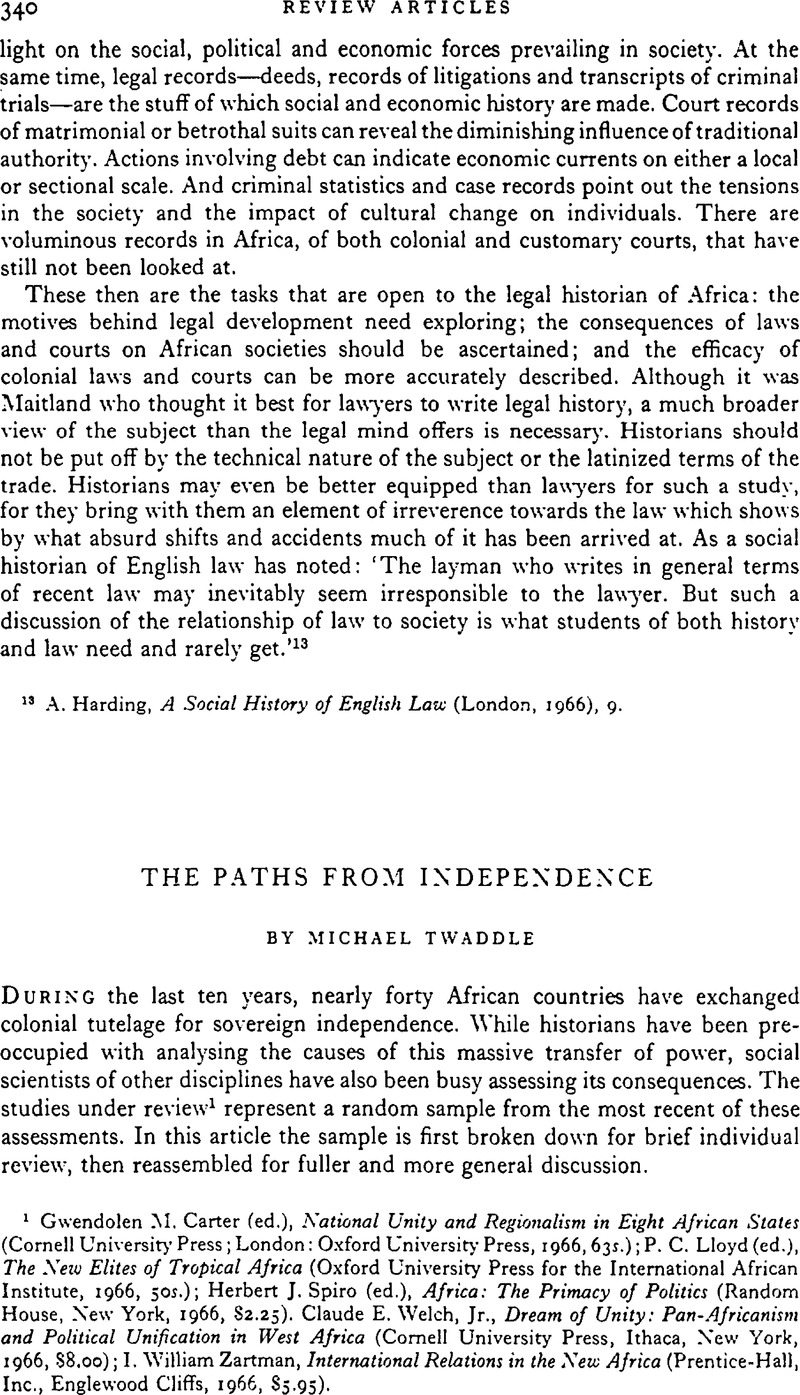No CrossRef data available.
Article contents
The Paths from Independence
Published online by Cambridge University Press: 22 January 2009
Abstract

- Type
- Review Articles
- Information
- Copyright
- Copyright © Cambridge University Press 1967
References
1 Carter, Gwendolen M. (ed.), National Unity and Regionalism in Eight African States (Cornell University Press; London: Oxford University Press, 1966, 63s.);Google ScholarLloyd, P. C. (ed.), The New Elites of Tropical Africa (Oxford University Press for the International African Institute, 1966, 50s.);Google ScholarSpiro, Herbert J. (ed.), Africa: The Primacy of Politics (Random House, New York, 1966, $2.25).Google ScholarWelch, Claude E. Jr, Dream of Unity: Pan-Africanism and Political Unification in West Africa (Cornell University Press, Ithaca, New York, 1966, $8.00);Google ScholarZartman, I. William, International Relations in the New Africa (Prentice-Hall, Inc., Englewood Cliffs, 1966, $5.95).Google Scholar
2 Hereinafter sometimes cited as National Unity and Regionalism.Google Scholar
3 Published in 1962 and 1963 also by Cornell University Press.Google Scholar
4 Apter, David E.. The Political Kingdom in Uganda (Princeton University Press, 1961).Google Scholar
5 Low, D. A., Political Parties in Uganda, 1949–62 (The Athlone Press for the Institute of Commonwealth Studies, 1962).Google Scholar
6 There are also a few minor inaccuracies in this section which might usefully be corrected in a later edition. Kakunguru never conquered Lango (p. 341); Hesketh Bell was Governor of Uganda from 1907 to 1909, not 1907 to 1911 (p. 342); to say that the Democratic ‘hardly exists’ in Lango (p. 390) is unwise, since it was holding bigger rallies than the UPC in late 1965.Google Scholar
7 Hereinafter cited also as Dream of Unit.Google Scholar
8 Especially Cameroun, considering the literature already devoted to the country: see Johnson, Willard P., ‘The Cameroon Federation’ in Lewis, William H. (ed.), French-Speaking Africa (New York, 1965),Google Scholar and Le Vine, Victor T., ‘The Cameroun Federal Republic’ in Carter, (ed.) Five African States op. cit.Google Scholar
9 The essays in question are: ‘The Quest for Political Stability in the Congo: Soldiers, Bureaucrats and Politicians’ by Edouard Bustin, ‘Political Influence in Southern Nigeria’ by Henry L. Bretton, ‘Mass Party Regimes in Africa’ by Clement Henry Moore, and ‘African politics in the United Nations’ by Thomas Hovet, Jr.Google Scholar
10 This point is made less emphatically in National Unity and Regionalism (p. Vi), where Professor Carter speaks of ‘the fear of popularizing stereotyped views that may reflect only temporary or limited phenomena’.Google Scholar
11 Carter, Gwendolen M. (ed.), African One-Party States (Ithaca, 1962), 3, 4.Google Scholar
12 This article was written just after Reuter reported the Togo coup of 13 January 1967.Google Scholar
13 Austin, D., ‘Coup d'état in Ghana’, Survival, (May, 1966);Google ScholarRathbone, R., ‘Ghana nach dem Staatsstreich’, Internationales Afrikaforum, (February 1967).Google Scholar
14 Evanston, Illinois, 1963.Google Scholar
15 See also Hoskyns, C., ‘The African States and the United Nations 1958–1964’, International Affairs, XL (1964), 466–480.CrossRefGoogle Scholar
16 Zartman gives 22–26 May 1963 as the dates of the Addis Ababa meeting, along with several other authorities. But the official records produced by the conference give 22–25 May as the actual dates. I owe this point to Mr R. Nagel.Google Scholar
17 See Mackay, V. (ed.) African Diplomacy, (London, 1966), 177–182, summarizing discussion of a paper by Professor Zartman on ‘National Interest and Ideology’.Google Scholar
18 See Austin, D. and Nagel, R., ‘The Organisation of African Unity’, The World Today, XXII (1966), 521, 521–9, for a Succinct discussion.Google Scholar
19 Legum, C. provides Pan-Africanism: A Short Political Guide (London, 1962) suggesting a coherent cluster of ideas, while D. Austin dismisses it as ‘little more than froth on the beer of local politics’, in his paper on ‘The Ghana Case’ in The Politics of Demilitarisation (University of London Institute of Commonwealth Studies, 1966), 54.Google Scholar
20 See, for example, the essay by M. Priestley on ‘The Emergence of an Elite: a Case Study of a West Coast Family’ in The New Elites of Tropical Africa, 87–100, and Porter, Arthur T., Creoledom (London, 1963).Google Scholar


